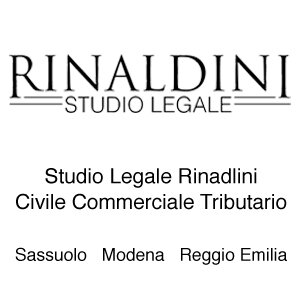Best Venture Capital Lawyers in Sassuolo
Share your needs with us, get contacted by law firms.
Free. Takes 2 min.
List of the best lawyers in Sassuolo, Italy
About Venture Capital Law in Sassuolo, Italy
Sassuolo is part of the Emilia-Romagna region, an important manufacturing and industrial hub in Italy, best known for its ceramic and advanced manufacturing clusters. Venture capital activity in Sassuolo tends to focus on tech that complements local strengths - industry 4.0 solutions, advanced manufacturing technologies, materials innovation, and digital services for manufacturing. Legal work for venture capital transactions in Sassuolo follows national Italian law, with additional relevance from regional supports and sector-specific rules. Venture capital deals here typically involve corporate structuring, investment agreements, shareholder governance, intellectual property protection, employment arrangements, and compliance with Italian and European financial and data-protection rules.
Why You May Need a Lawyer
You may need a lawyer if you are a founder seeking investment, an investor considering funding a Sassuolo-based company, or a service provider engaged by a startup or fund. Common situations include preparing a pitch-ready corporate structure, negotiating term sheets and shareholders' agreements, conducting or responding to due diligence, documenting convertible instruments or capital increases, advising on regulatory compliance for financial instruments, protecting intellectual property and trade secrets, handling employment and contractor issues, and structuring exit transactions such as sales or buyouts. Lawyers also help navigate tax incentives, public grants, and regional funding programs that often play a role in local projects.
Local Laws Overview
Venture capital transactions in Sassuolo are governed primarily by Italian national law, with some relevant European rules. Key legal aspects to consider include corporate law - especially rules in the Italian Civil Code on companies and shareholders - and the main company forms used for startups and investors such as societa a responsabilita limitata (S.r.l.) and societa per azioni (S.p.A.).
Italy has a special legal framework for innovative startups - "startup innovativa" - which provides benefits such as simplified incorporation rules, flexibility in governance, and tax and social security incentives. Many investors and founders use that regime when eligible. Investment structures often include capital increases, equity subscription, convertible instruments and warrants. Shareholders' agreements are critical to address governance, transfer restrictions, tag-along and drag-along rights, liquidation preferences and anti-dilution protections.
Financial regulation matters when public solicitation or regulated fund managers are involved. The national regulator CONSOB oversees public offers of securities and crowdfunding platforms, while the Bank of Italy and CONSOB have roles in supervising financial intermediaries. At the European level, managers of alternative investment funds must consider AIFMD rules where applicable.
Tax and incentive rules are important - Italy and the region offer R&D tax credits, patent-box type benefits in certain circumstances, and incentives or grants for innovation projects. Employment and social security law govern hiring, stock option plans and freelance contractor relationships. Intellectual property law and European data protection rules - notably GDPR - must be considered for technology and data-driven ventures.
Frequently Asked Questions
What corporate form should my startup in Sassuolo adopt to attract venture capital?
The most common forms are S.r.l. and S.p.A. An S.r.l. is flexible and often easier and cheaper to set up for early-stage companies, while an S.p.A. is more common for larger, investor-friendly equity structures. If eligible, registering as a "startup innovativa" adds benefits regardless of company form. Choose a structure with advice from a lawyer and accountant who know venture funding needs and investor expectations.
What is a term sheet and why is it important?
A term sheet is a non-binding or partially binding summary of the principal commercial terms of an investment. It sets expectations on valuation, investment amount, share class, governance, investor rights, liquidation preference and timelines. A lawyer helps make sure the term sheet reflects commercial intent and protects your position before drafting binding agreements.
How do shareholders' agreements protect founders and investors?
Shareholders' agreements supplement the company articles by setting out rights and obligations between shareholders. They cover voting, board appointments, transfer restrictions, pre-emption rights, tag-along and drag-along clauses, exit mechanics and dispute resolution. A well-drafted shareholders' agreement avoids future conflicts and provides clear mechanisms in key events.
What due diligence should I expect from a venture investor?
Due diligence typically includes corporate records, capitalization table, contracts, IP ownership and licenses, employment and contractor documentation, regulatory compliance, tax position, financial statements, and any litigation or contingent liabilities. A local lawyer helps organize these documents and address gaps before investors discover them.
Are convertible notes or SAFEs used in Italy?
Convertible instruments are used but must be structured within Italian corporate and tax law. SAFEs, common in some other jurisdictions, are less standard and require careful drafting to ensure enforceability and appropriate tax treatment in Italy. Lawyers with experience in Italian venture transactions should tailor instruments to local law.
What incentives or public funding can startups in Sassuolo access?
Startups can access national incentives such as programs run by Invitalia, regional grants from Emilia-Romagna, R&D tax credits and other innovation incentives. The "startup innovativa" status also brings benefits. A lawyer or advisor can help identify relevant programs and ensure compliance with grant conditions.
How is intellectual property best protected in a local manufacturing-focused ecosystem?
Protection may include patents for technical inventions, utility models where available, trademarks for brands, design protection for product appearance, and confidentiality agreements for trade secrets. Given the manufacturing cluster in the Sassuolo area, clear IP assignments from founders and contractors and careful employee agreements are essential to preserve ownership for investors.
What are common pitfalls for founders negotiating with venture capital in Italy?
Common pitfalls include agreeing to overly broad investor controls, failing to protect IP ownership, neglecting vesting schedules for founders, accepting unfavorable liquidation preferences or anti-dilution provisions, and neglecting tax or employment consequences of equity plans. Local legal advice helps avoid or mitigate these risks.
Do I need to comply with GDPR when handling customer or industrial data?
Yes. GDPR applies across Italy and the EU. Startups handling personal data must ensure lawful bases for processing, data security measures, data processing agreements with vendors, and appropriate privacy notices. Violation of data-protection rules can lead to significant fines and reputational harm.
How do exits typically work for investors in Sassuolo-based companies?
Exits may occur through trade sales to industry players, sales to financial investors, secondary transactions, or IPOs for more mature businesses. In a manufacturing district, strategic acquisitions by larger industry operators are common. Clear exit mechanics in shareholders' agreements and proper financial and legal preparation increase the likelihood of a smooth exit.
Additional Resources
Helpful organizations and bodies to consult include national regulators and agencies such as CONSOB and the Bank of Italy for financial regulation context, and Invitalia for national startup support programs. Regionally, Regione Emilia-Romagna and the Camera di Commercio di Modena provide local business support and information on incentives. Trade and industry groups like Confindustria Ceramica are useful in the Sassuolo ceramics and manufacturing ecosystem. For networking and sector expertise, look to regional incubators, accelerators and university technology transfer offices in Emilia-Romagna. For industry-specific investor guidance, consider the Italian association for private equity and venture capital - AIFI. Finally, a local law firm or lawyer with experience in venture capital and local industry practices is an indispensable practical resource.
Next Steps
If you need legal assistance with venture capital matters in Sassuolo, start by preparing a concise information pack - company documents, cap table, IP lists, employment arrangements, and any investor materials. Schedule an initial consultation with a lawyer experienced in Italian venture capital and local industry matters. During the consultation, discuss your business goals, typical deal terms you expect, potential investors, and any public funding you plan to use.
Ask prospective lawyers about their experience with venture transactions, startups and investor-side work, fee structure - fixed fees for standard documents and hourly rates for negotiations - and references. If you are a founder, prioritize lawyers who can help preventive work - clean up corporate records, secure IP and draft investor-friendly but balanced agreements. If you are an investor, seek counsel for due diligence and negotiation of protective provisions.
Finally, use local resources - the Chamber of Commerce, regional innovation hubs and national agencies - to explore grants and support that can complement venture funding. Combining experienced legal advice with local business support improves your chances of a successful investment or fundraising process.
Lawzana helps you find the best lawyers and law firms in Sassuolo through a curated and pre-screened list of qualified legal professionals. Our platform offers rankings and detailed profiles of attorneys and law firms, allowing you to compare based on practice areas, including Venture Capital, experience, and client feedback.
Each profile includes a description of the firm's areas of practice, client reviews, team members and partners, year of establishment, spoken languages, office locations, contact information, social media presence, and any published articles or resources. Most firms on our platform speak English and are experienced in both local and international legal matters.
Get a quote from top-rated law firms in Sassuolo, Italy — quickly, securely, and without unnecessary hassle.
Disclaimer:
The information provided on this page is for general informational purposes only and does not constitute legal advice. While we strive to ensure the accuracy and relevance of the content, legal information may change over time, and interpretations of the law can vary. You should always consult with a qualified legal professional for advice specific to your situation.
We disclaim all liability for actions taken or not taken based on the content of this page. If you believe any information is incorrect or outdated, please contact us, and we will review and update it where appropriate.









